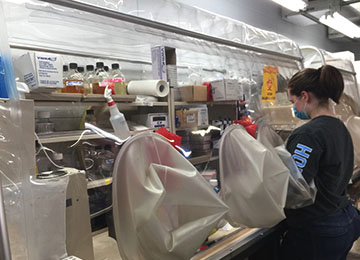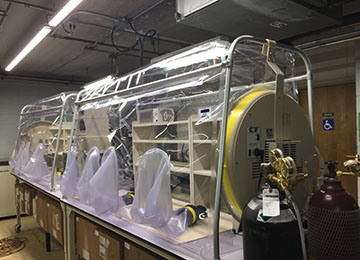

Bio-Technical Resources (BTR) has the equipment and experience that are required to perform microbiome research for human gut and other applications. We work closely with clients to develop cutting-edge health and medical technologies. We provide a variety of services to support needs for anaerobic microbiology research and development.
Microbiome Research and Development
While the potential applications of microbiome research are broad, from environmental solutions to medical innovations.
What is Microbiome Research?
The total population of microorganisms living together in a particular habitat is considered a microbiome. The human microbiome is the collection of all the microorganisms living in or on the human body. Scientists classify them into communities based on where they colonize; larger ones include the skin, gut, and lungs.
Each person’s microbiome is home to trillions of microorganisms, including bacteria, fungi, protozoa, and viruses — all of which work together to help keep the body at homeostasis for a healthy person.
At BTR, we specialize in human gut microbiome research; the microbiome which mostly encompasses the digestive tract.
A Brief Overview of Microbiome Research
Over the past decade, improvements in technology have allowed scientists to discover the immense impact human microbiome research will have on finding new treatments for disease, by studying how these microbiomes interact within our bodies as a whole.
For example, researchers have identified links between changes in gut bacteria and symptoms of serious disease, including type 2 diabetes, inflammatory bowel disease, Alzheimer’s disease, and many types of cancer.
Steps for Microbiome Research and Testing
For microbiome research and testing to be performed safely, consistently, and accurately, scientists must follow strict laboratory procedures in a controlled environment.
- Anaerobic Testing: Because most of the microbes in the human gut are anaerobic — meaning their cells perform metabolic processes in the absence of oxygen — research requires manipulations to be done in an anaerobic chamber. Bio-Technical Resources have installed several anaerobic chambers. Researchers must undergo important training to be able to complete an experiment within an anaerobic chamber, or else they risk contamination and invalid results.
- Animal Testing: Laboratories must follow strict, government-regulated procedures to be granted the ability to conduct animal testing, and are subject to regular inspection to make sure animal subjects are being treated accordingly. The USDA’s overview of these regulations can be found here.
- Human Trials: Human clinical trials related to microbiome research have been steadily increasing each year since around 2011. Because this type of research is still relatively new, however, the scientific community has not yet established specific, consistent global parameters for these trials in addition to existing general guidance for clinical trials. Most human trials involving the microbiome can be performed non-invasively.
Why We Need More Microbiome Research
The powerful abilities and insights derived from the human microbiome make it one of the most promising research fronts today.
The biotechnology community explores microbiomes to develop groundbreaking treatments for a variety of diseases, especially those concerning digestion and immune system function.
Plus, drug manufacturers have realized they must consider the human microbiome’s impact on medication delivery when developing formulations for new medicines. Aided by microbiome research, companies can proactively use microbial strains and enzymes to improve drug delivery and avoid toxicity.
Trends in Microbiome Research
According to a recent article in the medical journal Microbiol, microbiome research is more popular than ever — due to advances in technology, reduced costs of analysis, and potential for the research to lead to incredibly valuable insights and medical technology developments.
The wealth of data unlocked by human microbiome research helps medical scientists engineer new diagnostic techniques and interventional strategies for preventing and treating disease.
Many of these innovations stem in particular from research into interactions between microbes and the human body; the evolution and ecology of microbes, including how their environment affects them; using knowledge of microbial composition and interactions to develop medical engineering solutions; and developing interventional approaches by selectively altering microbial composition.
Microbiome Gut Research
Analysis and experimentation regarding the human microbiome involves a significant amount of gut microbiome research, as scientists strive to understand how it affects health and disease.
A History of Microbiome Research Services
Scientists became interested in studying gut microbiology/microbiome in the late 1800s. One of the earliest researchers in this area was Theodor Escherich, a German physician who observed gut flora during attempts to improve patients’ gastrointestinal conditions. Another was Alfred Nissle, who figured out how to create capsules of a form of E. coli to help the gut fight harmful intestinal bacteria.
The Microbiome and Probiotics
Probiotics are “friendly” types of microorganisms that reside in the gut microbiome, composed mostly of bacteria and yeasts. They provide benefits such as fighting off pathogenic bacteria, digesting food, and producing vitamins.
Probiotics can also refer to supplement products people consume in order to grow the population of helpful bacteria in the body, i.e. have a healthy “gut flora.” Consuming foods (such as yogurt, sauerkraut) and beverages (such as kombucha, kefir) that contain probiotics also supports maintaining population sizes of other beneficial microorganisms.
Gut Microbiome Disease Research
Today, gut microbiome research has even broader medical applications in addition to digestive health, such as in the treatment of metabolic diseases (type II diabetes, cardiovascular disease, high cholesterol, etc.), promoting infant health, and aiding in weight loss.
How Is Microbiome Gut Research Done?
While innovations in microbiome gut research are being made quickly, some of the established methodologies include DNA sequencing, genome analysis, species-specific quantitative qPCR, and biochemical analysis. You can find information on BTR’s services here.
Microbiome Research Methods
The earliest methods of microbiome research centered around simply using microscopes to observe particular microbial species, their relative abundance, and characteristics of the microorganism population. Today we have much more advanced tools at our disposal, such as DNA sequencing, species-specific quantitative qPCR, better data analysis, and more powerful equipment for the observation of microorganism interactions.
Anaerobic Chambers
It’s necessary to have an anaerobic chamber to perform microbiome research. This piece of laboratory equipment provides the oxygen-free atmosphere needed to work with microorganisms of the human gut.
How Anaerobic Chambers are Used in Microbiome Research Services
In microbiome research, an anaerobic chamber is used to circulate a mixture of hydrogen and nitrogen gas through a catalyst to remove oxygen, forming water as a byproduct. Scientists must follow strict procedures for keeping the chamber free from contamination, as they use the environment to study microorganisms of the gut microbiome.
Anaerobic Fermentation
A process called anaerobic fermentation is operated in the cell for carbon metabolism to generate energy in the absence of oxygen. The substrate they use instead of oxygen varies depending on the parameters of the experiment being conducted. Some strict anaerobic microorganisms could not survive in the presence of oxygen, i.e. oxygen is toxic to them. Anaerobic conditions in an anaerobic chamber become essential.
Anaerobic Chamber Microbiology
The anaerobic chamber is an integral tool in research on anaerobic microorganisms. The first chamber was only developed about 50 years ago, but has already allowed scientists to greatly expand our understanding of microorganisms and their processes — including those in the gut microbiome.
Most of the medical advancements (drug development, disease identification, etc.) achieved via gut microbiome research are made possible with the aid of an anaerobic chamber. For example, scientists may use the chamber to ascertain the type of pathogens present in a patient specimen, and whether or not it will respond to a particular treatment.
Microbial Interaction in Microbiome
The hydrolytic and reductive reactions of the gut’s microbiome affect the way oral medications are metabolized, and therefore how well those medications achieve their desired effect. The gut microbiome can degrade a drug, making it less effective; be used to activate a drug; or help modulate the enzymes that metabolize a drug.
For example, drug manufacturers must take precautions in drug formulations to ensure a medication isn’t degraded under the conditions (such as pH level) of the upper gastrointestinal tract before it has time to take effect.
Challenges in Microbiome Research
According to the most recent medical literature, one big challenge facing microbiome research stems from its relative newness — there’s still a lack of data standardization across the field. As new laboratory equipment and techniques are developed to further microbiome research, scientists are searching for ways to better collaborate and compare. Data and terminology standardization are important initial steps in that effort.
Developments in Microbiome Research Services
The number of medical research companies taking up gut microbiome research grows each year, as it continues to lead to promising new medical treatments.
In a piece for the medical journal Microbiome, a group of scientists wrote: “Research on the human microbiome has advanced from a fledgling field to a flourishing area of medical research, with more than $1.7 billion being spent over the past decade alone.”
Infant Microbiome Research Services
The medical community believes that the human gut microbiome is established immediately after an infant is born, with the initial population of bacteria coming from their mother. How this initial gut microbiome then colonizes and develops is influenced by the infant’s diet, especially breastmilk, and is the subject of extensive current research. For example, doctors are making strides with being able to strengthen an infant’s gut microbiome with probiotics and prebiotics, to treat issues with their immune system and potentially prevent them from developing more severe conditions.
This research also studies how our early gut microbiome may affect our health into adulthood.
Dietary Supplements and the Microbiome
Studies of the human gut microbiome are leading to innovations in dietary supplements to help people of all ages — such as probiotics, explained above.
Plus, in a recent paper for the medical journal Nutrients, researchers wrote that understanding how dietary nutrients modulate the gut microbiome is of great interest for the development of food products and eating patterns to combat the global transmission of disease.
Other Recent Microbiome Research
Microbiome research leads to significant discoveries that provide new perspectives in other fields, too. Scientists are using it to engineer environmental microbiomes for agriculture that would render toxic insect-repelling chemicals unnecessary, for example. It’s also considered one of our greatest tools in combating climate change, via its potential for replacing environmentally harmful practices.
Future Microbiome Research Services
We anticipate that much of future gut microbiome research will entail exploring its connections to brain physiology, which informs cognition (previously thought to be regulated only by the central nervous system) and disease progression.
Recent studies show that the bacteria present in the gastrointestinal tract help regulate and influence cognitive dysfunction, and impact the progress of neurodegeneration and cerebrovascular diseases.
One of the insights gleaned from this research is that microbes in the gut can release molecules that trigger inflammation in the central nervous system, which greatly affects the pathogenesis of diseases such as depression, anxiety, Alzheimer’s diseases, Parkinson’s disease, pain disorders, multiple sclerosis, and stroke.
Microbiome research may help us to finally understand why you are what you eat!
Bio-Technical Resources’ Microbiome Research Services
Because most of the microbes in the human gut microbiome are anaerobic, research requires an anaerobic chamber, which we are equipped with at Bio-Technical Resources. Our scientists are experienced in microbial isolation, phenotypical characterizations, DNA isolation, 16S RNA gene PCR and sequence analysis. We have essential equipment for microbiome research, including 96-well plate-based QIAGEN TissueLyser II for DNA isolation, Thermo NanoDrop 8000, and multiple Coy anaerobic chambers allowing concurrent use by 7 scientists.

